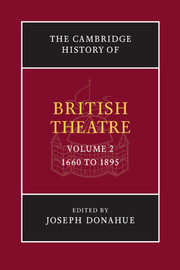Book contents
- Frontmatter
- Part I 1660 to 1800
- Part II 1800 to 1895
- 11 Introduction: the theatre from 1800 to 1895
- 12 Presence, personality and physicality: actors and their repertoires, 1776–1895
- 13 Theatres, their architecture and their audiences
- 14 Stage design from Loutherbourg to Poel
- 15 Theatre and mid-Victorian society, 1851–1870
- 16 Gendering Victorian theatre
- 17 Popular entertainment, 1776–1895
- 18 The Bells: a case study A ‘bare-ribbed skeleton’ in a chest
- 19 The new drama and the old theatre
- 20 1895 A critical year in perspective
- Bibliography
- Index
- References
12 - Presence, personality and physicality: actors and their repertoires, 1776–1895
from Part II - 1800 to 1895
Published online by Cambridge University Press: 28 March 2008
- Frontmatter
- Part I 1660 to 1800
- Part II 1800 to 1895
- 11 Introduction: the theatre from 1800 to 1895
- 12 Presence, personality and physicality: actors and their repertoires, 1776–1895
- 13 Theatres, their architecture and their audiences
- 14 Stage design from Loutherbourg to Poel
- 15 Theatre and mid-Victorian society, 1851–1870
- 16 Gendering Victorian theatre
- 17 Popular entertainment, 1776–1895
- 18 The Bells: a case study A ‘bare-ribbed skeleton’ in a chest
- 19 The new drama and the old theatre
- 20 1895 A critical year in perspective
- Bibliography
- Index
- References
Summary
He danced, he did not merely walk – he sang, he by no means merely spoke. He was essentially artificial in distinction to being merely natural …From the first to the last moment that Irving stood upon the stage each moment was significant …[E]very sound, each movement, was intentional – clear-cut, measured dance: nothing real – all massively artificial – yet all flashing with the light and pulse of nature.
In defending Henry Irving against William Archer’s criticism that he neither spoke nor moved naturally on stage, Edward Gordon Craig forges a critical language which encourages us to reformulate our perceptions of what mattered in late eighteenth— and nineteenth-century acting. His words provide a fitting epithet for those actors whose physicality, presence and fire enlivened a stage increasingly under pressure to follow a potentially reductive route towards realism and restraint. For Craig, the artificial and the natural were in opposition, yet strangely complementary. Indeed, from the late eighteenth century onwards discussions of acting were often conducted in binaries: the real versus the ideal; art versus nature; inspiration versus study; passion versus mannerism; imagination versus observation. Behind such debates lies the influence of Diderot, whose Paradox of Acting, in which he argued that consistently good acting depended on intellect rather than sensibility, engendered the heart-versus-head debate. They find more sophisticated expression in the dramatic criticism of James Leigh Hunt, William Hazlitt and G. H. Lewes, while they are subsequently formulated in the Coquelin—Irving—Boucicault discussions of acting in the second half of the nineteenth century and in William Archer’s Masks or Faces?
- Type
- Chapter
- Information
- The Cambridge History of British Theatre , pp. 272 - 291Publisher: Cambridge University PressPrint publication year: 2004
References
- 1
- Cited by



